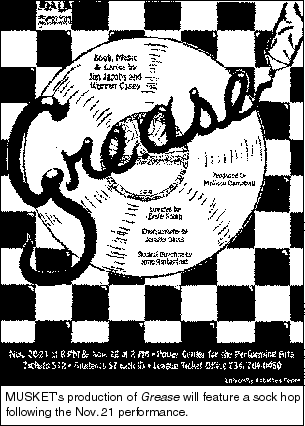The University Record, November 16, 1998
Once they greased the wheel, now they’re just into Grease!
By Joanne Nesbit
News and Information Services
 U-M students—and college students in general—have been known to do things that are considered just a little crazy. But in 1908, it was unusual even for college students to have men dress as women and sing to raise money.
U-M students—and college students in general—have been known to do things that are considered just a little crazy. But in 1908, it was unusual even for college students to have men dress as women and sing to raise money.
That is what happened when a group of students began one of the longest-standing traditions on the Michigan campus. They began raising funds to build a student union by selling tickets to the first Michigan Union Opera Production, “Michigenda.”
The all-male company toured in the fall and occasionally in the spring, visiting cities with strong Michigan alumni clubs. The funds garnered from these performances and those given on the campus helped pay for the construction of the Michigan Union. Additional funds came from a loan from the Michigan State War Preparedness Board that wanted to use the building as a barracks for World War I soldiers of the Students Army Training Corps, SATC.
The first two operas netted enough money to purchase the ground on which the Union now stands. Subsequent shows helped pay off the bonds on the building. Those efforts were just distant memories for some in 1984, when a routine cleaning as part of the Union’s renovation uncovered a hidden treasure of pictures, musical scores, programs, 80 rpm records and other Union Opera papers in the east wall of the Union’s Study Lounge. Those items became part of the Bentley Historical Library’s extensive holdings on the history and activities of the University.
Most of the early Union Opera productions were written, staged, and managed by undergraduates and were reported to be “burlesque comedy, often corny, sometimes crude, but always funny.” As a junior, 1909 graduate Roy Dickenson Welch wrote the plot, lyrics and all the music for the first opera, the three-act comedy “Michigenda.” The audience for “Michigenda” wouldn’t leave until after the fifth encore. Subsequent “operas” starred Heisman Trophy winner Tom Harmon and 1948 presidential nominee Thomas E. Dewey.
Though amateur performances, the 1919 director left a note saying, “Contrary to common opinion, the members of the chorus are not actors of mediocre ability. They must dance and sing well . . . [they] must master the complicated steps of the dances, and obtain unity and precision in their steps and songs.”
Not only was the Union Opera an all-male presentation with football stars and other athletes playing female chorus dancers and singers, women were not allowed into the Union unescorted. All that changed in 1956 when women were permitted in the Union and to audition for parts in the Union Opera.
These female performers forced a change in the name of the Union Opera to MUSKET, standing for Michigan Union Show, Ko-Eds, Too. That name still stands today and is synonymous with quality in student productions.
MUSKET will present “Grease!” at 8 p.m. Nov. 20 and 21 and at 2 p.m. Nov. 22 at the Power Center for the Performing Arts. The Nov. 21 performance will be followed by a sock hop in the lobby immediately following the show. Tickets for all performances—$12, $7 for students with ID—are available at the Michigan League Ticket Office.
You can always drop us a line: [email protected].

